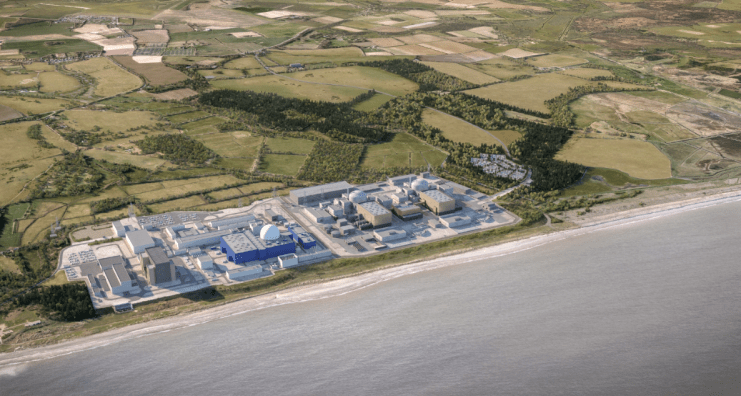Government backs Sizewell C as Hunt approves £700m funding

The UK’s nuclear ambitions were given a fresh vote of confidence from the Government today, after Chancellor Jeremy Hunt confirmed he would back the proposed Sizewell C nuclear power plant with an initial £700m investment.
Hunt announced contracts for the funding would be signed within a matter of weeks, paving the way for its eventual approval.
The funding pledge was first made by Boris Johnson this summer, in one of his final acts as Prime Minister.
There had been doubts swirling in recent weeks over the funding, amid growing concerns it could be axed by Hunt in his scramble for savings – forcing Downing Street into a denial.
Hunt said: “Our £700 million investment is the first state backing for a nuclear project in over 30 years and represents the biggest step in our journey to energy independence.”
Downing Street is targeting a near-quadrupling of the UK’s nuclear capacity over the next three decades, aiming to ramp up domestic generation capabilities from 7GW to 24GW.
Sizewell C is the next proposed project after Hinkley Point C, which is currently under construction, and has been shortlisted for further public funds in the initial stage of development.
It is being overseen by French energy giant EDF, and would have a generation capacity of 3.2GW, enough to power six million homes and meet seven per cent of the UK’s energy needs.
If approved, it will be built under the regulatory asset base model, where taxpayers fund the initial stages of its construction before private investment is attracted to complete the project.
The Government is looking to revitalise the nuclear sector – which has declined to just 16 per cent of the UK’s power generation, with six reactors from its ageing fleet set to close by the end of the decade.
Sizewell C project key for future nuclear plans
Concerns have also been raised by policy experts and think tanks over the budget of the project, as it is near identical to Hinkley Point C – which has soared over budget from £18bn to £26bn and has been delayed a year from 2026 to 2027.
The estimated costs of Sizewell C are yet to be disclosed, with estimates varying from £20-35bn.
Andy Mayer, energy analyst at free market think tank the Institute of Economic Affairs, has called on the Government to focus on alternative projects such as small, modular reactors – which would be quicker to develop and more cost efficient.
He said: “”There are small modular reactor alternatives, which if proven and cost effective, and with the right reforms to planning and permitting, could be built much more quickly coming on stream before Sizewell C.”
Meanwhile, the Nuclear Industry Association has welcomed the Government’s decision to proceed with the plant.
The group’s chief executive, Tom Greatrex, argued the project’s scale was vital for driving down bills and boosting the country’s energy independence.
He described the approval of funds as “huge moment for Sizewell C, for UK energy security and for the future of nuclear in Britain.:
Greatrex said: “The UK now needs to urgently get on with building new nuclear plants alongside renewables to meet the targets set out in the Energy Security Strategy, and we look forward to Sizewell C contracts being signed in the next few weeks.
Earlier this week, Julia Pyke, head of financing for Sizewell C, told the Welsh Affairs Committee that future projects were dependent on the power plant being pushed through.
She argued the proposed potential site Wylfa site in Angelsey, North Wales, was reliant on a pipeline of power plants being pushed through – with the Welsh project potentially next in line as a GW nuclear site after Sizewell C.
She said: “We need to get Sizewell C over the line, we need to keep the momentum in the programme. Then there needs to be a decision over whether there is going to be a GW plant.”